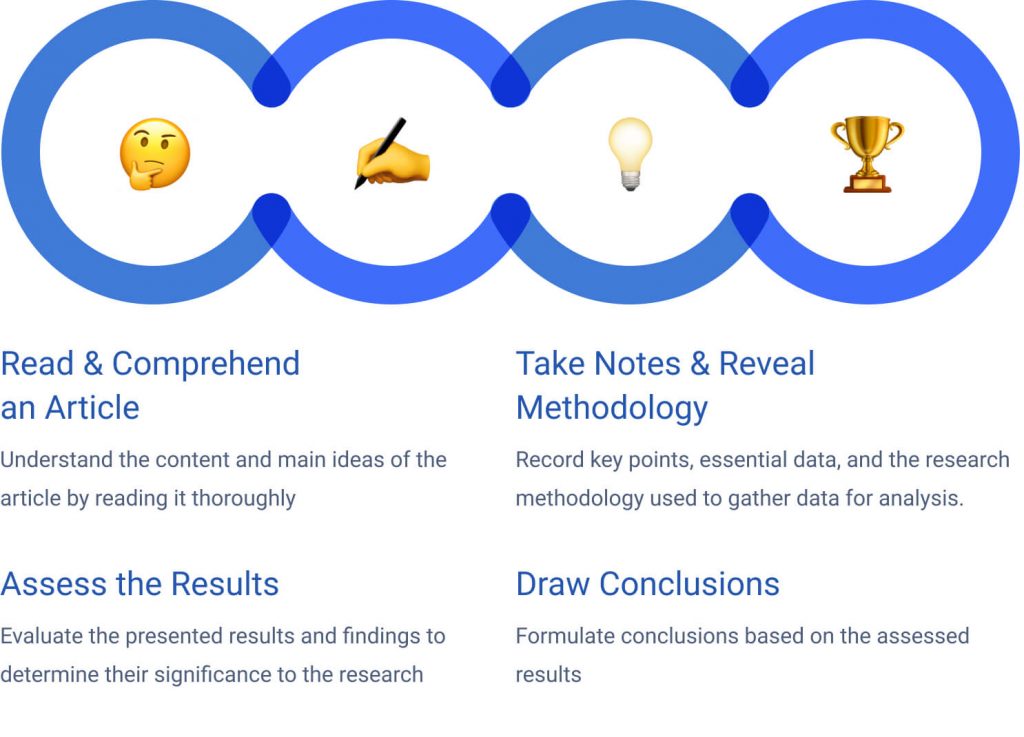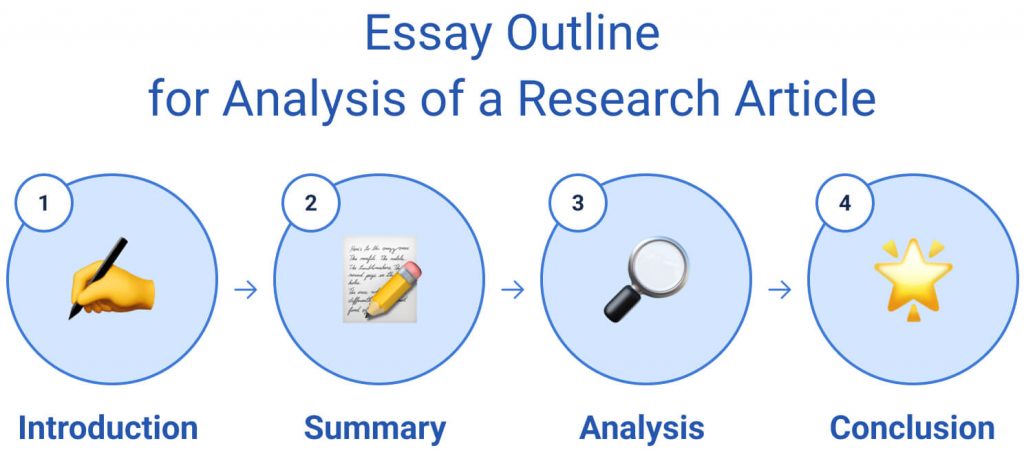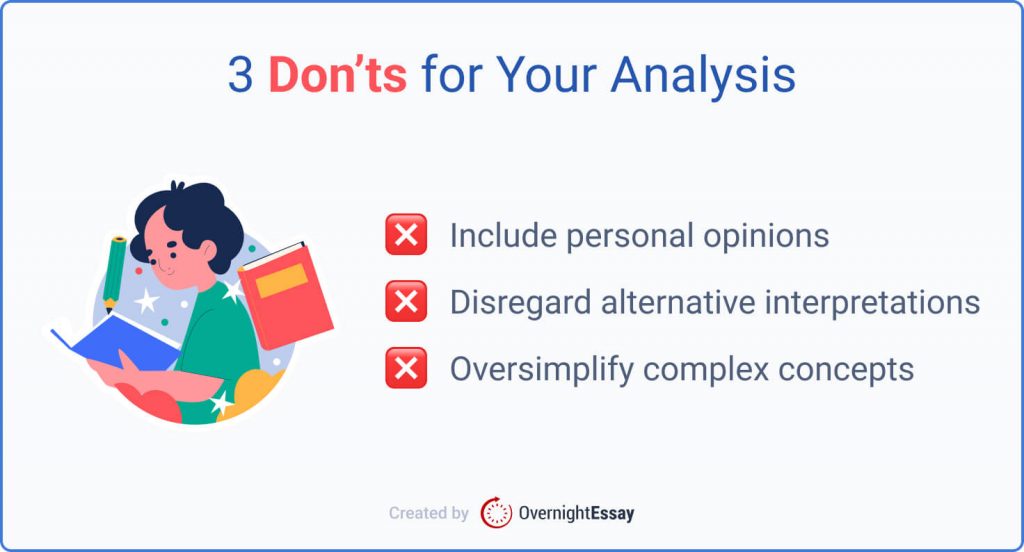Analyzing a scientific paper is a complicated task that requires knowledge and systematic preparation. This process favors patience over haste and offers a deep and nuanced exploration of the presented research. Fully understanding the peculiarities of content analysis may seem complicated, especially when it comes to evaluating the results.
Our team has developed a thorough guide to make your writing process more comfortable and focused. We offer helpful tips and examples to help you create a paper worthy of admiration from college professors. This guide has everything for a stellar and in-depth argument analysis.
🤔 What Is a Research Article Analysis?
A research genre analysis is a genre of academic writing that lets students assess issues and arguments presented in research articles. They review the text’s content and determine its validity through critical thinking. It involves a great deal of topic analysis. After studying the source, they provide an assessment of the claims with evidence that support or disprove them. It’s their job to establish which of the statements are flawed and which are valid. Students also summarize the article and explain its relevance to the field of study.
🎯 Analysis of a Paper: Main Goals
📑 How to Analyze a Research Article – 4 Key Steps
Research paper analysis is often both educational and complicated. Taking a structured approach to this task makes it a lot easier. This section of our guide discloses the four stages that help better understand the content of a scientific paper. Follow our analysis plan to learn how to write about things like results and methodology analysis.

Research Paper Analysis: Read an Article & Take Notes
You can’t critique a research piece without reading the source material first. Skimming over the paper won’t do, as you’ll miss crucial details for your analysis. Follow these steps to ensure you get the most out of the paper while critically evaluating its contents.
- Read the paper once to have a general understanding of what it’s about. Ensure you are familiar with the topic beyond elementary knowledge. You may also read up on related literature beforehand.
- Read the second time and take notes. Read the entire research paper carefully, paying attention to the results, discussion, and conclusion sections. It’s better to take detailed notes as you read, summarizing each section in your own words.
- Outline the results of the study. Write a short rundown of what the author found during the search.
Research Paper Analysis: Comprehend & Reveal the Methodology
Once you’re done with the first step, it’s time to move on to the second stage of research paper analysis: comprehending and revealing the methodology. You can’t possibly remember everything about the article so that you can revise your notes.
- Explore key terms and concepts of an article. If you don’t fully understand them, take the time to familiarize yourself with them.
- Find the hypothesis or the research question the author decided to tackle. Check the facts, arguments, and logic behind their thinking to view the paper critically.
- Look at the validity of the arguments. Research sources used in the article and assess the credibility of the supporting evidence.
- Identify the study’s methodology. Find out how the author approached the research and what its results were. Once you establish the methodology, evaluate the quality of the information, including the methods of data gathering and analysis.
Research Paper Analysis: Assess the Results
After completing the second part of the analysis, it’s time to assess the research results. Establish if the findings support the paper’s hypothesis and their statistical relevance. Address any limitations of the study. For example, a writing on psychology that uses a small group of participants that cannot be considered representative of a larger population. It may be true that the researcher did this intentionally to skew their findings. However, it’s best to be balanced in your article critique and talk about the strong sides of the paper as well. Look at similar studies and see if they came to the same conclusions.
Research Paper Analysis: Draw Conclusions
After you’ve completed the previous steps, you’re ready to make conclusions about the research paper as a whole. Don’t forget to include the following information when working on this part of the analysis:
- Determine the theoretical and practical meaning of the results. For example, if the paper found a particular treatment effective, emphasize that it should be used more often.
- Consider the applications of the research results. Try to find out how they can be applied to the broader field and what ethical implications they may lead to.
- Show how they relate to the big picture. Finally, your analysis should show how the article expands the knowledge of the subject and what it means to further studies.
📝 Research Analysis Template: Essay Outline
Writing a research paper analysis can be demanding. These papers have several characteristics that set them apart from other types of academic writing. We’ve created this simple template to explain the content each part of your assessment should have.

✨ 5 Tips for Writing an Analysis of Paper
Mastering the art of writing a research paper analysis takes time and practice. We’ve decided to provide five great tips that will make this process easier and more enjoyable:
- Take the time to establish the right angle for your analysis. If you can choose its direction, study the paper first and choose the best subject for your work. You can develop several ideas and select the right one later.
- Connect all evidence to your argument. When conducting the analysis, find facts and data supporting your point of view. Explain the connection of each piece of evidence to your statement and showcase what makes it particularly significant.
- Stay balanced. A good analysis covers all facts and looks at them objectively. When confronted with data that clashes with your stance, check it and use evidence to bolster the credibility of your arguments.
- Work on an outline. Good analysis is often grounded in well-structured outline. Write down ideas and topic sentences that connect to various parts of the research sample and its general idea.
- Evaluate all evidence. All evidence has a place in your analysis. Use all of it, even if you come across contradictory facts. Include information that doesn’t fully support the main idea of your analysis and build compelling counterarguments.

️ ✒️ Research Paper Analysis Example
Seeing an example of a finished text can point you in the right direction. Our team has found an excellent research paper analysis example to inspire your subsequent work and show how to approach the structure correctly.
Article Analysis Perceptions of ADHD Among Diagnosed Children and Their Parents.
In this work, the author evaluates the findings on the perception of ADHD-diagnosed children in developed countries.
Research Article Analysis Topics
Now that you understand how to write a research paper analysis, it’s time to find the right topic for your paper. Below, you’ll find fifteen exciting ideas to inspire your analytical pursuits.
- Review a research paper on the effects of carbon emissions.
- Explore a recent research article on the use of opioids in American healthcare.
- Assess a research paper on the applications of the Large Hadron Collider.
- Discuss quantitative research about mental health rates in developed countries.
- Investigate a recent research paper about the rise of surveillance technology.
- Analyze a qualitative research paper on the effectiveness of biofuels as an alternative energy source.
- Study quantitative methods of research on the housing market in Canada.
- Scrutinize a research article about the use of pesticides in food production.
- Evaluate a paper on the efficiency of anti-climate change measures.
- Assess a recent study on the dangers of sugar consumption.
- Survey the latest research on fast food advertising tactics.
- Consider a paper on the most recent developments in string theory.
- Address a recent research article about artificial intelligence.
- Cover research about the benefits of using nuclear power.
We did our best to cover all crucial points of research article analysis and prepare you for this kind of academic work. When you have the time, share our guide with fellow students who can benefit from the content of our work!